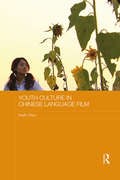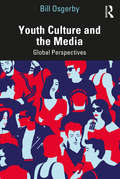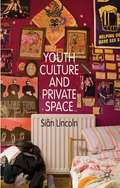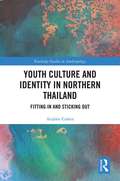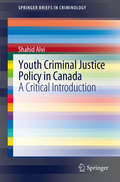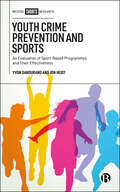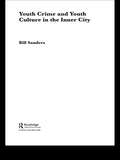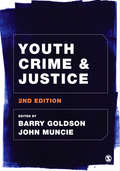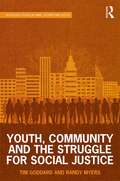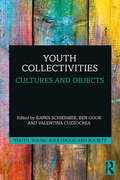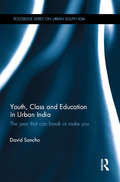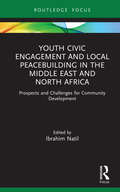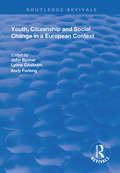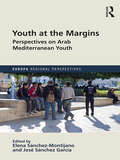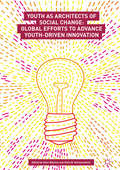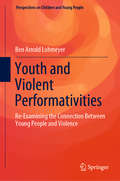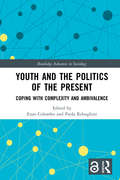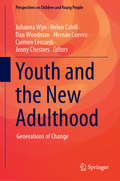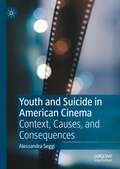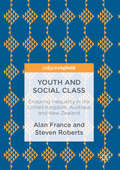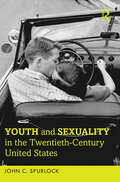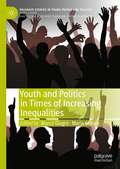- Table View
- List View
Youth Culture in Chinese Language Film (Media, Culture and Social Change in Asia)
by Xuelin ZhouThis book explores the vigorous film cultures of mainland China, Taiwan and Hong Kong from the perspective of youth culture. The book relates this important topic to the wider social, cultural, and institutional context, and discusses the relationship between the films and the changes that today are transforming each society. Among the areas explored are the differences between the three film industries, their creation of new types of screen hero and heroine, and their conflicts with traditional Chinese attitudes such as respect for age. The many films discussed provide fresh perspectives on the ways in which young people are coping with gender, sexuality, class, coming of age, the pressures of education, and major social shifts such as rural to urban migration. They show young adults in each society striving to construct new value systems for a complex, rapidly changing environment.
Youth Culture and the Media: Global Perspectives
by Bill OsgerbyThis expansive, lively introduction charts the connections between international youth cultures and the development of global media and communication. From 1950s drive-ins and jukeboxes to contemporary social media, the book examines modern youth cultures in their social, economic, and political contexts. Exploring the rise of young people as a distinct media market, the book examines the relation of youth to modern consumerism, marketing, and digital technologies. The chapters are packed with analysis of media representations of youth, debates about the media’s 'effects' on young audiences, and young people’s use of the media to elaborate identities and negotiate social relationships. Drawing on a wealth of international examples, the book explores the impact of globalisation and new media technologies on youth cultures around the world. Assessing a profusion of worldwide research, the book shows how modern youth cultures can only be understood as part of an international web of connections, exchanges, and experiences. With an ideal balance between detailed examples and engaging analysis, this book is a must-read for anyone interested in youth cultures and the modern media.
Youth Culture and Private Space
by Siân LincolnSi#65533;n Lincoln considers the use, role and significance of private spaces in the lives of young people. Drawing on extensive ethnographic research, she explores the place of 'the private' in youth cultural discourses, both historically and contemporarily, that until now have remained largely absent in youth cultural research.
Youth Culture and Identity in Northern Thailand: Fitting In and Sticking Out (Routledge Studies in Anthropology)
by Anjalee CohenYouth Culture and Identity in Northern Thailand examines how young people in urban Chiang Mai construct an identity at the intersection of global capitalism, state ideologies, and local culture. Drawing on over 15 years of ethnographic research, the book explores the impact of rapid urbanisation and modernisation on contemporary Thai youth, focusing on conspicuous youth subcultures, drug use (especially methamphetamine use), and violent youth gangs. Anjalee Cohen shows how young Thai people construct a specific youth identity through consumerism and symbolic boundaries – in particular through enduring rural/urban distinctions. The suggestion is that the formation of subcultures and “deviant” youth practices, such as drug use and violence, are not necessarily forms of resistance against the dominant culture, nor a pathological response to dramatic social change, as typically understood in academic and public discourse. Rather, Cohen argues that such practices are attempts to “fit in and stick out” in an anonymous urban environment. This volume is relevant to scholars in Thai Studies, Southeast Asian Studies, Anthropology, Sociology, Urban Studies, and Development Studies, particularly those with an interest in youth, drugs, and gangs.
Youth Criminal Justice Policy in Canada
by Shahid AlviIn the past ten years, much has changed in terms of youth justice policies in Canada as well as in the way Canadian society has evolved. Canada has a new Act governing youth crime, and there are indications that the Act will be revised again to make it "tougher" on youth in conflict with the law, a development reflecting what many scholars are calling the "punitive turn" in youth justice policies in Canada and elsewhere. At the same time, Canadian child poverty rates (which are strongly correlated with criminality) have remained high, despite a commitment, made by governments in 1989 to eradicate the problem by the year 2000. Immigration patterns have changed, and unemployment rates for young Canadians remain almost twice as high as those for adults. In this volume, Youth Criminal Justice Policy in Canada: A Critical Introduction, the author addresses these and other developments in relation to youth crime in Canada from a critical criminological perspective.
Youth Crime Prevention and Sports: An Evaluation of Sport-Based Programmes and Their Effectiveness
by Yvon Dandurand Jon HeidtSport-based crime prevention programmes are becoming increasingly popular worldwide but until now there has been very little research on the effectiveness of such approaches. Bringing together authoritative evidence from existing programmes, the authors identify and analyse emerging successful practices. Covering mentoring and coaching, particularly as they relate to Positive Youth Development (PYD) programmes, the authors explore how the development of core life skills can improve individual resilience and decrease the risk of criminal involvement. The book conceptualizes the links between criminological theory and PYD and gives recommendations for future policy and practice.
Youth Crime and Youth Culture in the Inner City (Routledge Advances in Sociology)
by Bill SandersYouth Crime and Youth Culture in the Inner City offers an interpretive account of juvenile delinquency within the modern inner city, an environment which is characterized by a long history of social deprivation and high rates of crime. A wide range of topics are explored, such as young people's motivation for, frequency of, and attitudes towards, a variety of illegal behaviors, such as street robbery, burglary, theft, drug use, drug selling and violence. Why do young people commit these offences? Who do they commit them against? How do they feel afterwards? This book attempts to answer these important theoretical questions, utilizing ethnographic research collected over a seven year period and based around the London inner city borough of Lambeth.
Youth, Crime and Justice
by Cyndi BanksYouth, Crime and Justice takes a critical issues approach to analyzing the current debates and issues in juvenile delinquency. It encourages readers to adopt an analytical understanding encompassing not only juvenile crime, but also the broader context within which the conditions of juvenile criminality occur. Students are invited to explore the connections between social, political, economic and cultural conditions and juvenile crime. This book engages with the key topics in the debate about juvenile justice and delinquency: juvenile institutions delinquency theories gender and race youth and moral panic restorative justice youth culture and delinquency. It clearly examines all the important comparative and transnational research studies for each topic. Throughout, appropriate qualitative studies are used to provide context and explain the theories in practice, conveying a powerful sense of the experience of juvenile justice. This accessible and innovative textbook will be an indispensable resource for senior undergraduates and postgraduates in criminology, criminal justice and sociology.
Youth Crime and Justice
by Barry Goldson John MuncieBuilding upon the success of the first edition, this second - and substantially revised - edition of Youth Crime and Justice comprises a range of cutting-edge contributions from leading national and international researchers. The book: Situates youth crime and youth justice within historical and social-structural contexts; Critically examines policy and practice trends and their relation to knowledge and ‘evidence’; and Presents a forward looking vision of a rights compliant youth justice with integrity. An authoritative and accessible book, Youth Crime and Justice (2nd ed) provides a coherent, comprehensive and fully up-to-date analysis of contemporary developments and debates. A must for researchers, teachers, students and practitioners.
Youth Crime and Justice
by John Muncie Barry Goldson`Youth Crime and Justice presents a detailed and comprehensive critical analysis of evidence from leading national and international scholars. As such it provides a powerful antidote to the excesses of contemporary correctionalism' - Professor Andrew Rutherford, University of Southampton `Youth Crime and Justice is the most comprehensive and up-to-date collection on the market today. A must for all researchers, teachers and students of youth justice' - Professor Tim Newburn, London School of Economics and Political Science and President of the British Society of Criminology For the first time, leading national and international scholars have been brought together to engage explicitly with a comprehensive critical assessment of the relation between 'evidence' and contemporary youth justice policy formation. This book, along with its companion volume Comparative Youth Justice (edited by John Muncie and Barry Goldson) , will significantly advance the development of an emerging 'youth criminology'. The book is essential reading for criminology and criminal justice students, researchers and practitioners. Contributors' Affiliations: Tim Bateman is a Senior Policy Development Officer with Nacro, a UK-based crime reduction agency Chris Cunneen is Professor of Criminology and Director of the Institute of Criminology at the University of Sydney Matthew Follett is a Lecturer in Criminology at the University of Leicester Loraine Gelsthorpe is a Reader in Criminology and Criminal Justice at the Institute of Criminology, University of Cambridge Barry Goldson is a Senior Lecturer in Sociology at the University of Liverpool, England. Kevin Haines is Head of Applied Social Sciences at the University of Swansea Lynn Hancock is a Lecturer in Sociology at the University of Liverpool Harry Hendrick is an Associate Professor of History at the University of Southern Denmark Gordon Hughes is Professor of Criminology at the International Centre for Comparative Criminological Research at the Open University Fergus McNeill is a Senior Lecturer at the Glasgow School of Social Work, Universities of Glasgow and Strathclyde Phil Mizen is a Senior Lecturer in Sociology at the University of Warwick John Muncie is Professor of Criminology and Co-Director of the International Centre for Comparative Criminological Research at the Open University David O'Mahony is a Senior Lecturer in Youth Justice at the Institute of Criminology and Criminal Justice, School of Law, Queen's University Belfast Gilly Sharpe is a Doctoral Research Student at the Institute of Criminology, University of Cambridge David Smith is Professor of Criminology at Lancaster University Roger Smith is a Lecturer in Social Work at the University of Leicester Colin Webster is a Senior Lecturer in Criminology at the University of Teesside Rob White is Professor of Sociology and Head of the School of Sociology and Social Work at the University of Tasmania
Youth, Community and the Struggle for Social Justice (Routledge Studies in Crime, Security and Justice)
by Tim Goddard Randy MyersActivists, policymakers, and scholars in the US have called for policy reform and evidence-based efforts to decrease the number of people in jail and prison, improve hostile police–community relations, and rollback the "tough on crime" movement. Given that poor people, particularly poor people of color, make up the majority of those under carceral control in Western, industrial countries, can technical solutions, gradual reforms, and individual-level programming genuinely change the deeply entrenched carceral state that has been expanding in the US for over 40 years? In this book, the authors offer an examination of the creative ideas that twelve US-based social justice organizations put forward for how participation in social change might spur not only individual-level change in young people, but community-wide mobilization against the harms resulting from the "tough on crime" movement and neoliberal policy. Using alternative programs grounded in political and social consciousness-raising, these organizations provide important and novel methods for how we might roll back carceral expansion. Their approaches resonate with scholarship in criminology and related fields; however, they sharply contrast with popular notions of "what works". The authors detail how community-based organizations must navigate not only these scientific forces, but the bureaucratic and financial ones consistent with neoliberal governance as well as the more formidable, less navigable political barriers that activate when organizations mobilize young people of color for social and carceral reform. While aware of the formidable barriers they face, the authors highlight the emancipatory potential of community-based social justice organizations working with the most marginalized young people across several major US cities. Written in an accessible way, this book will be of interest to scholars, students, progressive policymakers, practitioners, and activists and their allies who are deeply troubled by the class and racial disparities that pervade the carceral state.
Youth Collectivities: Cultures and Objects (Youth, Young Adulthood and Society)
by Bjørn SchiermerThis volume seeks to address what its contributors take to be an important lacuna in youth cultural research: a lack of interest in the phenomenon of collectivity and collective aspects of youth culture. It gathers scholars from diverse research backgrounds – ranging from contemporary subculture studies, fan culture studies, musicology, youth transitions studies, criminology, technology and work-life studies – who all address collective phenomena in young lives. Ranging thematically from music experience and festival participation, via soccer fan culture, leisure, street art, youth climate activism, to the design of EU youth policies and Australian government ‘project’ work with young migrants, the chapters develop a variety of approaches to collective aspects to young cultural practices and material cultures. To establish these new approaches, the contributors combine new theories and fresh empirical work; they critically engage with the tradition and they complement or even reconfigure traditional approaches in and around the field. The book will be of interest to researchers in a broad range of areas in and around the field of youth culture studies including post-subculture studies, cultural studies, musicology, fan-culture and youth transition research, but it is also of acute interest for theoretically interested sociologists. The volume offers a new afterword by French sociologist Michel Maffesoli.
Youth, Class and Education in Urban India: The year that can break or make you (Routledge Series on Urban South Asia)
by David SanchoUrban India is undergoing a rapid transformation, which also encompasses the educational sector. Since 1991, this important new market in private English-medium schools, along with an explosion of private coaching centres, has transformed the lives of children and their families, as the attainment of the best education nurtures the aspirations of a growing number of Indian citizens. Set in urban Kerala, the book discusses changing educational landscapes in the South Indian city of Kochi, a local hub for trade, tourism, and cosmopolitan middle-class lifestyles. Based on extensive ethnographic fieldwork, the author examines the way education features as a major way the transformation of the city, and India in general, are experienced and envisaged by upwardly-mobile residents. Schooling is shown to play a major role in urban lifestyles, with increased privatisation representing a response to the educational strategies of a growing and heterogeneous middle class, whose educational choices reflect broader projects of class formation within the context of religious and caste diversity particular to the region. This path-breaking new study of a changing Indian middle class and new relationships with educational institutions contributes to the growing body of work on the experiences and meanings of schooling for youths, their parents, and the wider community and thereby adds a unique, anthropologically informed, perspective to South Asian studies, urban studies and the study of education.
Youth Civic Engagement and Local Peacebuilding in the Middle East and North Africa: Prospects and Challenges for Community Development (Routledge Explorations in Development Studies)
by Ibrahim NatilThis book investigates the ways in which young people engage with and contribute to civil society, community development, and local peacebuilding in the Middle East and North Africa (MENA). Youth engagement and contribution to civil society and local peacebuilding can play a crucial role in development; however, there is often a lack of effective engagement, policies, and opportunities for young people in policy and practice. This book analyses their experiences of civic engagement and community participation and the challenges they face, across diverse areas including youth empowerment, freedom of expression, mobilization, ideologies, conflict resolution, and peacebuilding. Drawing on cases from Yemen, Syria, Iran, Morocco and the Palestinian Territories, this book offers new insights on how youth not only are shaped by, but also react to policies, conflict, constraints, and challenges. The insights drawn from this interdisciplinary collection will be of interest to researchers of civil society, youth, peacebuilding, and development, as well as to policymakers, donors, and NGO staff.
Youth, Citizenship and Social Change in a European Context (Routledge Revivals)
by John Bynner Lynne Chisholm Andy FurlongPublished in 1997, this text is built around themes agreed upon for a conference which aimed to set the agenda for youth research over the next decade. These themes are: the shaping of trajectories and biographies - individualization, agency, structure; vulnerable groups excluded and included youth, polarization, marginalization; social construction of identity - identity, culture, gender, ethnicity; political and social participation and citizenship. The book brings together the work of British and Continental researchers.
Youth at the Margins: Perspectives on Arab Mediterranean Youth (Europa Regional Perspectives)
by Elena Sánchez-Montijano Jose Sánchez GarcíaThe 2011 Arab uprisings led to a great proliferation of studies on the situations in the Arab countries of the Mediterranean, with particular attention given to their young people, whose role was particularly central. Eight years on, in-depth exploration is still needed of the conditions in which millions of (mainly young) people demanded change. In this context, this volume examines the state and diversity of the forms of socioeconomic, political and cultural marginalization facing the region's young men and women, as well as the strategies and routes of contestation by which they escape them. Through the interdisciplinary empiricism of this book, based on the results emerging from the SAHWA Project (funded by the European Commission under the Seventh Framework Programme, grant agreement nº 613174), we aspire to build a complex description and analysis of the current situation of the Arab Mediterranean youth. The aim is to fathom out young people’s patterns, agency and living conditions, focusing on the relational character of the juvenile worlds actively constructed by themselves. The authors explore the main trends that are reflected in the social strategies, cultural constructions and changes within the Arab youth population, and whether the creation of new lifestyles and the emergence of youth cultures are an indicator of sociopolitical transitions. To answer all these questions the researchers have conducted a comprehensive study in five Arab Mediterranean countries: Algeria, Egypt, Lebanon, Morocco and Tunisia. Based on mixed method research the data collection is composed of two primary sources: the SAHWA Youth Survey 2016 (2017), in which 10,000 young people were interviewed; and the SAHWA Ethnographic Fieldwork 2015, involving more than 200 young people.
Youth as Architects of Social Change
by Sheri Bastien Halla B. HolmarsdottirThis edited collection outlines the issues central to youth engagement in research and social innovation. Youth-driven innovation for social change is increasingly recognized as holding potential for the development of sustainable strategies to tackle some of the most pressing global challenges of our time. The contributors provide additional knowledge concerning what actually constitutes an enabling environment, as well as the most effective approaches for engaging youth as architects of change. While sensitive to the need for contextual appropriateness, the volume contributes to the development of shared understandings and frameworks for engaging and spurring youth-driven innovation for social change worldwide. Youth-Driven Social Innovation showcases examples of youth engagement in frugal and reverse innovation worldwide, alongside examples which demonstrate the tremendous potential of South-South learning, but also learning and youth innovation in the Global North. It will be of interest to students and scholars across a range of disciplines including education, sociology, anthropology, public health, and politics.
Youth and Violent Performativities: Re-Examining the Connection Between Young People and Violence (Perspectives on Children and Young People #11)
by Ben Arnold LohmeyerThis book challenges the dominant narrative of young people being a uniquely violent group. Instead, the book critically examines how young people become violent as they enact and resist the available violent performativities in youth. It focuses on the experiences of 28 young people in Australia who are subjected to violence, who use violence and who resist violence. A critical analysis of these young people’s “messy” stories facilitates a reframing of the physical violence routinely attributed to young people as a product of violating systems and structures. The author constructs a converging theoretical landscape to re-examine youth, violence and resistance at the intersection of the sociology of violence and the sociology of youth. Drawing on interviews with young Australians, the book makes a valuable contribution to contemporary international scholarship on youth and violence, while also examining the potential for complicity to violence in youth research and practice. In doing so it offers youth scholars and practitioners a framework for reassessing their theoretical frameworks and methods for studying and working with young people in connection with violence.
Youth and the Politics of the Present: Coping with Complexity and Ambivalence (Routledge Advances in Sociology)
by Enzo Colombo Paola RebughiniYouth and the Politics of the Present presents a range of topical sociological investigations into various aspects of the everyday practices of young adults in different European contexts. Indeed, this volume provides an original and provocative investigation of various current central issues surrounding the effects of globalization and the directions in which Western societies are steering their future. Containing a wide range of empirical and comparative examples from across Europe, this title highlights how young adults are trying to implement new forms of understanding, interpretation and action to cope with unprecedented situations; developing new forms of relationships, identifications and belonging while they experience new and unprecedented forms of inclusion and exclusion. Grounding this exploration is the suggestion that careful observations of the everyday practices of young adults can be an excellent vantage point to grasp how and in what direction the future of contemporary Western societies is heading. Offering an original and provocative investigation, Youth and the Politics of the Present will appeal to students and researchers interested in fields such as Youth Studies, Globalization Studies, Migration Studies, Gender Studies and Social Policy.
Youth and the New Adulthood: Generations of Change (Perspectives on Children and Young People #8)
by Johanna Wyn Jenny Chesters Dan Woodman Helen Cahill Hernán Cuervo Carmen LeccardiThis book investigates the life trajectories of Generation X and Y Australians through the 1990s and 2000s. The book defies popular characterizations of members of the ‘precarious generations’ as greedy, narcissistic and self-obsessed, revealing instead that many of the members of these generations struggle to reach the standard of living enjoyed by their parents, value learning highly and are increasingly concerned about the environment and the legacy current generations are leaving for their children and remain optimistic in the face of considerable challenges. Drawing on data from the Life Patterns longitudinal study of Australian youth (an internationally recognized study), the book tells the story of members of these ‘precarious generations’. It examines significant dimensions of young people’s lives across time, comparing how domains such as health and well-being, education, work and relationships intersect to produce the complex outcomes that characterize the lives of members of each of these generations. It also explores the strategies these generations use to make their lives and the ways in which they remain resilient. While the book is based on Australian data, the analysis draws on and contributes to the international literature on young people and social change.
Youth and Suicide in American Cinema: Context, Causes, and Consequences
by Alessandra SeggiThis book explores the depiction of suicide in American youth films from 1900 to 2019. Anchored in Sociology, this multidisciplinary study investigates the causes and consequences of suicide and uncovers the socio-cultural context for the development of youth, film, and suicide. While such cinematic portrayals seem to privilege external explanations of suicide versus internal or psychological ones, overall they are neither rich nor sensitive. Most are simplistic, limited or at the very least unbalanced. At times, they are flatly controversial. In light of this overall problematic depiction of suicide, this book offers a proactive approach to empower young audiences—a media literacy strategy to embrace while watching these films.
Youth and Subculture as Creative Force
by Hans Skott-MyhreRadical youth work is gaining popularity as a means of teaching adults how, in collaboration with youth, they can challenge dominant ways of knowing. This study uses two particular subcultures, skinheads and punks, to explore how constructions of subcultures in time, language, space, body practice, and identity offer alternative ways of understanding youth-adult relationships. In doing so, it investigates youth work as a radical political process and suggests a new approach to current subculture theory. In Youth and Subculture as Creative Force, Hans Arthur Skott-Myhre interviews six youths who identify themselves as members of either punk or traditional skinhead subcultures. He discusses the results of these interviews and demonstrates how youth perspectives have come to inform his understanding of himself as a youth worker and scholar. Youth subcultures, he argues, have considerable potential for improving relations between youths and adults in the postmodern capitalist world. Drawing on Marxist, Foucauldian, and postmodernist theory, Skott-Myhre uses the subjective formations outlined in his study to offer recommendations for constructing legitimate radical youth work that takes into account for the perspectives of young people.
Youth and Social Class: Enduring Inequality in the United Kingdom, Australia and New Zealand
by Alan France Steven RobertsThis book addresses the recent marginalisation of class theory in youth sociology. The authors argue for the importance of reinstating class analysis as central to understanding young people’s lives in the United Kingdom, Australia and New Zealand. Their analysis recognises that in periods of social change, class relationships and processes can and do get reconfigured, but by drawing on the work of Pierre Bourdieu, they show that class, while being dynamic, remains core to shaping the everyday lives of young people. Students and scholars across a range of areas including the sociology of youth, sociology of education, social work and social policy will find this book of interest.
Youth and Sexuality in the Twentieth-Century United States
by John C. SpurlockWhen did the sexual revolution happen? Most Americans would probably say the 1960s. In reality, young couples were changing the rules of public and private life for decades before. By the early years of the twentieth century, teenagers were increasingly free of adult supervision, and taking control of their sexuality in many ways. Dating, going steady, necking, petting, and cohabiting all provoked adult hand-wringing and advice, most of it ignored. By the time the media began announcing the arrival of a ‘sexual revolution,’ it had been going on for half a century. Youth and Sexuality in the Twentieth-Century United States tells this story with fascinating revelations from both personal writings and scientific sex research. John C. Spurlock follows the major changes in the sex lives of American youth across the entire century, considering how dramatic revolutions in the culture of sex affected not only heterosexual relationships, but also gay and lesbian youth, and same-sex friendships. The dark side of sex is also covered, with discussion of the painful realities of sexual violence and coercion in the lives of many young people. Full of details from first-person accounts, this lively and accessible history is essential for anyone interested in American youth and sexuality.
Youth and Politics in Times of Increasing Inequalities (Palgrave Studies in Young People and Politics)
by Marco Giugni Maria GrassoYoung people are very often the driving forces of political participation that aims to change societies and political systems. Rather than being depoliticized, young people in different national contexts are giving rise to alternative politics. Drawing on original survey data collected in 2018, this edited volume provides a detailed analysis of youth participation in nine European countries by focusing on socialization processes, different modes of participation and the mobilization of youth politics. "This volume is an indispensable guide to understanding young European’s experience and engagement of politics, the inequalities that shape young people’s political engagement and are sometimes replicated through them, and young people’s commitment to saving the environment and spreading democratic ideals. Based on compelling and extensive research across nine nations, this volume makes important advances in key debates on youth politics and provides critical empirical insights into which young people engage, influences on young people’s politics, how young people engage, why some young people don’t engage, and trends across nations. The volume succeeds in the herculean task of focusing on specific national contexts while also rendering a comprehensive picture of youth politics and inequality in Europe today."—Jennifer Earl, Professor of Sociology, University of Arizona, USA "Forecasts by social scientists of young people’s increasingly apathetic stance towards political participation appear to have been misplaced. This text, drawing data and analysis across and between nine European countries, captures the changing nature of political ‘activism’ by young people. It indicates how this is strongly nuanced by factors such as social class and gender identity. It also highlights important distinctions between young people’s approaches towards more traditional (electoral) and more contemporary (non-institutional) forms of participation. Critically, it illuminates the many ways in which youth political participation has evolved and transformed in recent years. Wider social circumstances and experiences are identified as highly significant in preparing young people for, and influencing their levels of participation in, both protest-oriented action and electoral politics."—Howard Williamson, Professor of European Youth Policy, University of South Wales, UK "This book is an incredible guide to understanding the role and sources of inequalities on young people’s political involvement. Country specific chapters allow the authors to integrate a large number of the key and most pressing issues regarding young people’s relationship to politics in a single volume. Topics range from social mobility and the influence of socioeconomic (parental) resources and class; young people’s practice in the social sphere; the intersection of gender with other sources of inequalities; online participation and its relationship with social inequalities; the impact of harsh economic conditions; the mobilization potential of the environmental cause; to the role of political organizations. Integrating all these pressing dimensions in a common framework and accompanying it with extensive novel empirical evidence is a great achievement and the result is a must read piece for researchers and practitioners aiming to understand the challenges young people face in developing their relationship to politics."—Gema García-Albacete, Associate Professor of Political Science, University Carlos III Madrid, Spain
